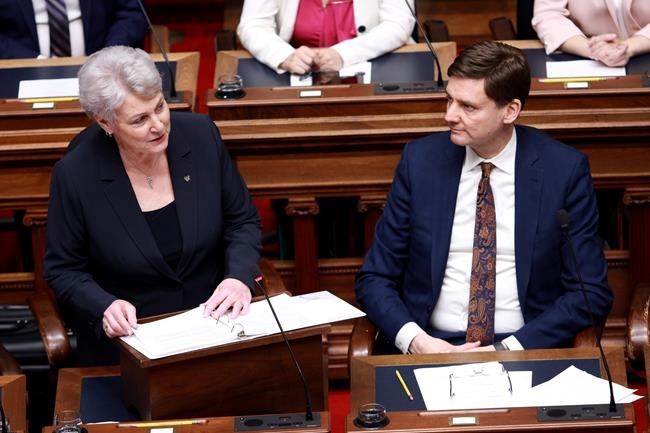VICTORIA — British Columbia has tabled legislation to enact a 20 per cent flipping tax on those who sell their home within the first year of ownership.
Finance Minister Katrine Conroy told the legislature that the tax is aimed at speculators who use housing only to turn a quick profit and it will make "profiteers think twice about a practice that inflates housing costs during a housing crisis."
The tax rate starts out at 20 per cent of income earned from a property sold within 365 days, falling to zero at 730 days when the tax no longer applies.
Conroy told reporters Wednesday that her office estimates the tax will apply to about 4,000 home sales a year.
"Wealthy investors are using housing as a short-term investment to make a fast profit, while people looking for homes can't get into the market," she said.
"Buying a home is one of the biggest decisions and milestones in people's lives, whether it's their first apartment or a new home to make space for the growing family, and we don't think families should have to compete against speculators when they're making such an important decision."
The tax was introduced in this year's budget, which says it is expected to generate $43 million in the first full fiscal year, and the province has promised the money will go directly to building affordable housing.
Heidi Marshall, with the Condominium homeowners Association of BC, told the news conference that speculators often create an unstable environment for strata corporations.
"Simply put, speculators are often more interested in profit, and not necessarily what is in the best interest of the strata corporation," she said.
"The result is they often vote against needed repair and maintenance or an increase in strata fees. This legislative change will support sustainable strata communities in B.C."
The legislation provides exemptions for events including separation, divorce or death.
Conroy said it also wouldn't apply to sellers who add to the housing market, such as those creating a basement suite.
The provincial tax is on top of the federal tax on flipping that started in 2023.
B.C. Housing Minister Ravi Kahlon said about seven per cent of the province's housing sales in the last two years have been speculative in nature, meaning the federal tax is "not enough."
"I think the federal government has recognized what we recognize, and what we hear every day from British Columbians, which is our housing should be for people and not for speculators," he said.
"And so as the minister of finance has highlighted, the way this tax is structured is that it works in conjunction with the federal government's."
The British Columbia Real Estate Association has said the tax will lower sales in the province by 1.7 per cent, have minimal affect on home prices, and risks discouraging people from putting homes on the market.
The association's chief economist, Brendon Ogmundson, said in an interview Wednesday that its position hasn't changed and added that he thinks the government has accepted that the tax won't apply to a lot of transactions.
He said speculators taking advantage of the current conditions is a symptom of the market being undersupplied.
"The only way to counteract that long term is to have an abundance of housing," he said.
Ogmundson gave credit to the government for trying to grow the housing supply through policies aimed at increasing density.
"Those are exactly the policies that we should have been doing for the past decade. It's good they're doing them now, but it's going to take a long time for those policies to work," he said
Conroy said the tax is one tool being used to make housing more affordable.
"We feel that it's a win-win for everybody. It's going to create housing. And if it doesn't, if they're going to pay their taxes, that money goes directly to create more housing. So it's all about creating housing," she said.
— By Ashley Joannou in Vancouver
This report by The Canadian Press was first published April 3, 2024.
The Canadian Press



